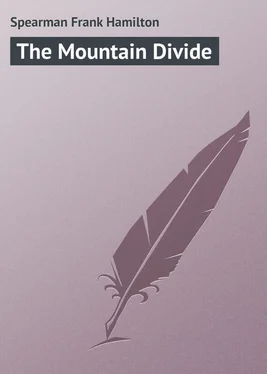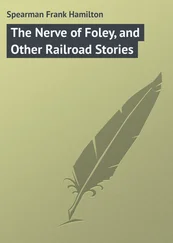Frank Spearman - The Mountain Divide
Здесь есть возможность читать онлайн «Frank Spearman - The Mountain Divide» — ознакомительный отрывок электронной книги совершенно бесплатно, а после прочтения отрывка купить полную версию. В некоторых случаях можно слушать аудио, скачать через торрент в формате fb2 и присутствует краткое содержание. Жанр: foreign_prose, foreign_adventure, на английском языке. Описание произведения, (предисловие) а так же отзывы посетителей доступны на портале библиотеки ЛибКат.
- Название:The Mountain Divide
- Автор:
- Жанр:
- Год:неизвестен
- ISBN:нет данных
- Рейтинг книги:4 / 5. Голосов: 1
-
Избранное:Добавить в избранное
- Отзывы:
-
Ваша оценка:
- 80
- 1
- 2
- 3
- 4
- 5
The Mountain Divide: краткое содержание, описание и аннотация
Предлагаем к чтению аннотацию, описание, краткое содержание или предисловие (зависит от того, что написал сам автор книги «The Mountain Divide»). Если вы не нашли необходимую информацию о книге — напишите в комментариях, мы постараемся отыскать её.
The Mountain Divide — читать онлайн ознакомительный отрывок
Ниже представлен текст книги, разбитый по страницам. Система сохранения места последней прочитанной страницы, позволяет с удобством читать онлайн бесплатно книгу «The Mountain Divide», без необходимости каждый раз заново искать на чём Вы остановились. Поставьте закладку, и сможете в любой момент перейти на страницу, на которой закончили чтение.
Интервал:
Закладка:
Sitting afterward by the camp-fire, Scott and Iron Hand, since the young chief would not talk English, conversed in the Sioux tongue, the scout translating freely for his younger companion, while the squaws dressed the second antelope and cut it up for convenience in carrying on the horses to Casement’s camp. Scott reserved only the hind-quarters of each animal for himself and Bucks, giving the rest to their hosts.
When it was late, Scott showed the boy how to pillow his head on his saddle and then stretched himself out to sleep. Bucks lay a long time looking up at the stars. When he fell asleep, he woke again very soon. His companion was sleeping peacefully beside him, and he saw Iron Hand sitting by the fire. Bucks easily imagined his arm would keep him awake. The squaws were still broiling pieces of antelope over the little blaze, which was neither bigger nor smaller than before, and together with the chief they were still eating. Bucks slumbered and woke again and again during the night, but always to see the same thing–the three Indians sitting about the fire, broiling and eating the welcome and wholly unexpected venison.
CHAPTER IV
Before daybreak the scout roused his companion, and, after breakfast with the three Sioux, who, according to Bob, were still eating supper, the two hunters left their chance companions in the canyon, rode rapidly south, and, with their antelope haunches as trophies, reached Casement’s camp about ten o’clock.
Stanley, who was conferring with Casement, came out of the tent greatly amazed at his scout’s venturing so far on a hunt as to expose himself and his companion to danger.
“We were safe every minute, colonel,” declared Scott.
“Safe?” echoed Stanley incredulously. “No man is safe, Bob, a mile from the track-layers. The Sioux killed and scalped one of our engineers not ten miles from here, when we were running this very line last winter.”
“This lad,” nodded Scott, “is as good a shot as I am. He brought down the first antelope. We get along with the Sioux all right, too, don’t we, Bucks?” he demanded, appealing to his fellow-hunter. “We ate supper with them last night,” he added to mystify his listeners, “and camped with Iron Hand.”
Even General Casement stared at this and waited to hear Scott tell Stanley the story of their night’s adventure. “However, colonel,” concluded Scott, “there is a war party of Cheyennes near here. It is a good time to be careful.”
“All right, Bob,” retorted Stanley, looking at his scout keenly, though no one could be angry at Scott long. “You set the example.”
The words were hardly out of his mouth when an operator came running down the track from the telegraph tent with a message for General Casement. It contained word from the operator at Peace River that section men reported a war party of Indians, crossing the railroad near Feather Creek, had attacked an emigrant party camped there.
In an instant the whole construction camp had the news and the work was thrown into confusion. Feather Creek was twenty miles away. Orders flew fast. A special train was made up, and Stanley taking command, with Casement to aid, made ready instantly to leave for the scene of the disaster.
The men running from the grade fell into line like veteran soldiers. Indeed, most of them had seen service in the war just closed and the smell of powder was no novelty. Bob Scott turned the venison over to Oliver and loaded his horse in the car with those of the cavalrymen. Under Stanley’s orders he himself rode as pilot in the cab with the engine crew. Bucks also reported to Stanley, and within twenty minutes the relief train carrying two hundred men was plunging down the long hill toward Feather Creek. Heads were craned out of the car windows, and in rounding every curve Bucks, with the scout Leon Sublette, sitting greatly wrought up behind Stanley and Casement, expected momentarily to see Cheyenne war bonnets spring up out of the stunted cedars that lined the hills along the right of way.
But not a sign could be seen of any living thing. The train reached Feather Creek, and slowly crossed the bridge before Scott signalled the engineman to stop. His eye had detected the scene of the fight, and the ground beyond–a low cut–was favorable for getting the men safely out of the cars.
As the engine slowed, a little scene of desolation beside the right of way met Bucks’s eye, and he caught sight of the ghastly battle-field. A frightened section crew emerged from the wild-plum thickets along the creek bottom, as the cavalrymen, followed by Casement’s armed men, poured out of the three cars. Stanley with his scouts led the way to the emigrant camp, where the fight had taken place. The wagons had been burned, the horses run off, and the three unfortunate men butchered.
Bucks experienced a shock when Scott came upon the three dead men whose mutilated bodies had been dragged from the scene by the section men and who lay with covered faces side by side under a little plum-tree, fragrant with blossoms and alive with the hum of bees. The sunshine and the beauty of the spot contrasted strangely with the revolting spectacle upon the grass.
Stanley gave the orders by which the bodies were conveyed to the train and with the scouts and cavalrymen reconnoitering the surrounding country, Casement’s men lay on their arms in the shade of the cut. Dancing rigged a pony instrument to the telegraph wires, which had not been disturbed, and Bucks transmitted messages to Fort Kearney advising the commanding officer of the murders and adding afterward the report of Scott and Sublette as to the direction the marauders had taken in flight.
“Who were the beasts, Bob, that could treat men like that?” demanded Bucks in an angry undertone, when he had clicked the messages over the wires.
“Bad Indians,” answered Scott sententiously. “You have that kind of white men, don’t you? These fellows are probably Turkey Leg’s thieving Cheyennes. We shall hear more of them.”
In the meantime the scouts and the cavalry detail rode out again trying to unmask the Cheyennes, but without success. It was a week before they were even heard of, and after an all-day attempt to do something, the train backed up to camp and work was resumed as if nothing had happened.
After waiting a few days, Stanley, always restive under idleness, determined to push on across the Sweet Grass country with horses, to learn how the timber cutters on the river were faring with their slender military guard. The party, consisting of the detail of ten men and the two scouts and Bucks, started one morning at sunrise and made their way without molestation into the little-known mountain range called then, as far south as Colorado, the Black Hills.
Stanley explained to Bucks during the morning how the chief engineering difficulty of the whole transcontinental line confronted the engineers right where they were now riding. Here the mountains were thrown abruptly above the plain to a great height and the locating engineers were still at their wits’ ends to know how to climb the tremendous ascent with practicable grades. Stanley became so interested in studying the country during the day, as the difficulties of the problem presented themselves afresh to him, that the party made slow progress. Camp was pitched early in the afternoon under a ridge that offered some natural features for defence. Here the cavalrymen were left, and Stanley, taking Scott, started out after some venison for supper. Bucks stood by, looking eager as the two made ready for the hunt.
“Come along if you like,” said Stanley at length. “You won’t be happy, Bucks, till you get lost somewhere in this country.”
Sublette lent Bucks a rifle, and the three men set out together, riding rapidly into the rough hills to the northwest. Scott covered the ground fast, but he searched in vain for sign of antelope. “Indians have been all over this divide,” he announced after much hard riding and a failure to find any game. “It doesn’t look like venison for supper to-night, colonel. Stop!” he added suddenly.
Читать дальшеИнтервал:
Закладка:
Похожие книги на «The Mountain Divide»
Представляем Вашему вниманию похожие книги на «The Mountain Divide» списком для выбора. Мы отобрали схожую по названию и смыслу литературу в надежде предоставить читателям больше вариантов отыскать новые, интересные, ещё непрочитанные произведения.
Обсуждение, отзывы о книге «The Mountain Divide» и просто собственные мнения читателей. Оставьте ваши комментарии, напишите, что Вы думаете о произведении, его смысле или главных героях. Укажите что конкретно понравилось, а что нет, и почему Вы так считаете.












